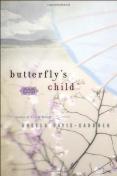BKMT READING GUIDES
Butterfly's Child: A Novel
by Angela Davis-Gardner
Hardcover : 352 pages
2 clubs reading this now
0 members have read this book
Introduction
When three-year-old Benji is plucked from the security of his home in Nagasaki to live with his American father, Lt. Benjamin Franklin Pinkerton, and stepmother, Kate, on their farm in Illinois, the family conceals Benji's true identity as a child born from a liaison between an officer and a geisha, and instead tells everyone that he is an orphan.
Frank struggles to keep the farm going while coping with his guilt and longing for the deceased Butterfly. Deeply devout Kate is torn between her Christian principles and her resentment of raising another woman's child. And Benji's life as an outcast?neither fully American nor fully Japanese?forces him to forge an identity far from the life he has known.
When the truth about Benji surfaces, it will splinter this family's fragile dynamic, sending repercussions spiraling through their close-knit rural community and sending Benji on the journey of a lifetime from Illinois to the Japanese settlements in Denver and San Francisco, then across the ocean to Nagasaki, where he will uncover the truth about his mother's tragic death.
A sweeping portrait of a changing American landscape at the end of the nineteenth century, and of a Japanese culture irrevocably altered by foreign influence, Butterfly's Child explores people in transition?from old worlds to new customs, heart's desires to vivid realities?in an epic tale that plays out as both a conclusion to and an inspiration for one of the most famous love stories ever told.
A Letter from Author Angela Davis-Gardner
 © Ed McCann |
As the curtain fell on a magnificent performance of Puccini's opera Madama Butterfly, a friend turned to me, and, amidst the applause and bravos, said, ?I wonder what happened to Butterfly's child.? The question fell like a seed into fertile ground. I was just finishing a novel, Plum Wine, which is set in Japan and for which I had done extensive research about 19th and 20th century Japanese culture and history. In the world of my imagination I was still in Japan and didn?t want to leave. My mind set immediately to work. In the tragic climax of the opera, the geisha Butterfly kills herself because her lover and her son's father, Lieutenant Benjamin Franklin Pinkerton, has returned to Japan after a long absence with a ?real? wife, an American wife, Kate. Butterfly leaves behind her a young child, after having agreed that Pinkerton can take their son with him to America. The boy--I would name him Benji, after his father, I decided-- stares down at his mother's body, the bloody sword still in her hand. Offstage, a tormented Pinkerton sings, ?Butterfly, Butterfly.? Benji would be forever bereft, and his father racked with guilt. An implacable shadow would fall over the newly configured family-- Pinkerton, Kate, and Benji--as they settled in the American Midwest. Kate would try her best to make the poor child feel at home and to please her husband, like a good nineteenth-century wife, but she would be unable to forget her husband's beautiful Japanese mistress, given the presence of Butterfly's child at her table. A lonely child and a troubled family: this is the terrain of much of my fiction. Furthermore, I was drawn to writing about a character of mixed heritage and uncertain identity, not fully Japanese nor fully American, ?a bat between cultures,? as the Japanese saying goes. I had been raised in the segregated South and had long wanted to write about the appalling racial discrimination I had witnessed. I transposed my passion onto Benji's tale, knowing that he would encounter discrimination in both America and Japan. I began my research in Midwestern libraries and archives. One day I saw, on a nineteenth century map, a town named ?Plum River? in Jo Daviess county near Galena, Illinois. I had just written a novel in which Japanese plum trees are a central image; the name seemed propitious. I got in my rented car and drove. I found the nearby towns, Stockton and Elizabeth, still flourishing, but no Plum River. Then, on a back road that ran through fields of tall corn, I saw on the side of a dilapidated building--perhaps once a grain or feed store--the faded words, Plum River. It was a deserted community, waiting to be repopulated. On a road that ran along a small, twisting river--Plum River, I realized--there was, on a slight incline, a place where a house might have been. I walked up the hill and stood beneath a small cluster of trees, looking out at the lush meadow, the river, the thicket of plum trees along its banks. A delicious shiver went through me. I had found the Pinkerton's home; I had begun.
Discussion Questions
No discussion questions at this time.Book Club Recommendations
Recommended to book clubs by 0 of 0 members.
Book Club HQ to over 90,000+ book clubs and ready to welcome yours.
Get free weekly updates on top club picks, book giveaways, author events and more








